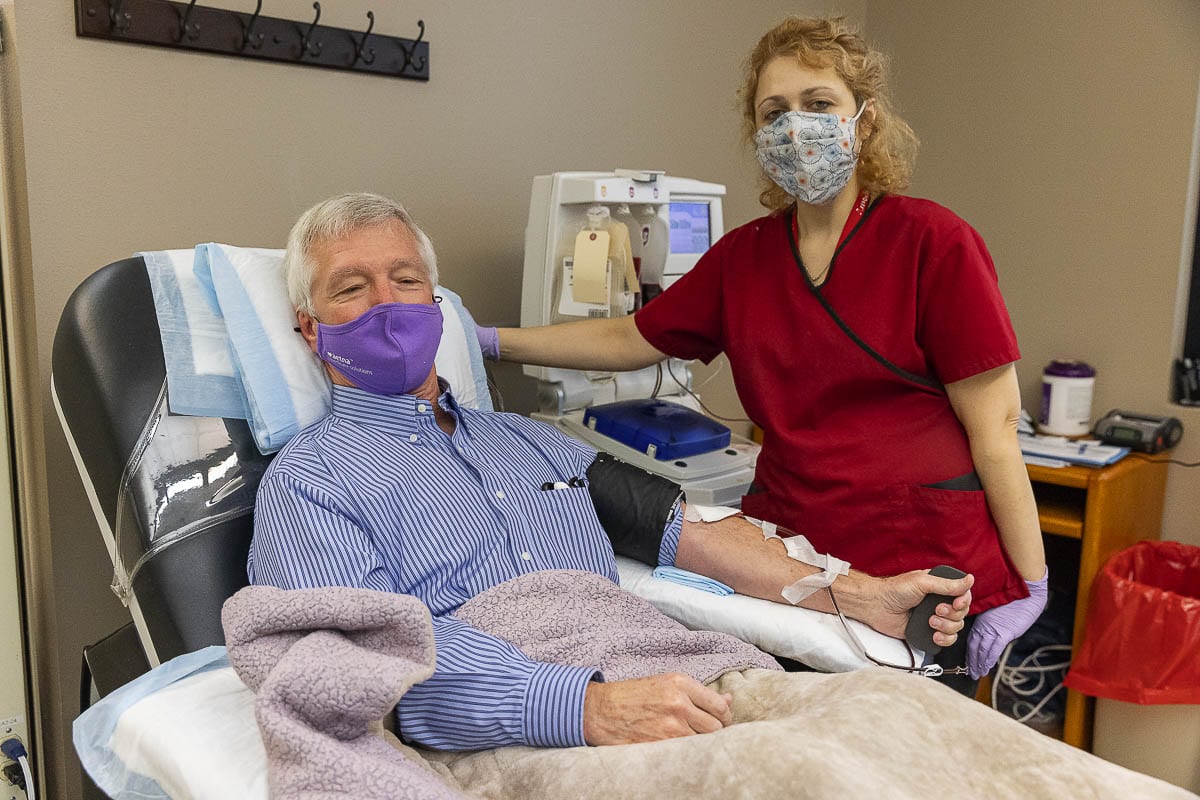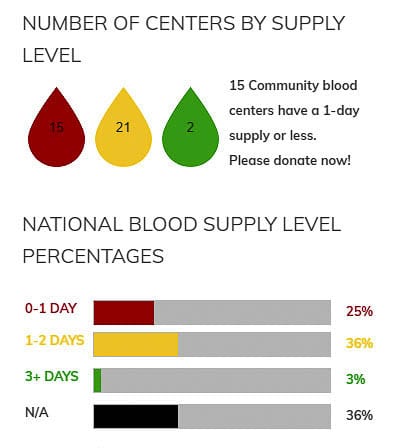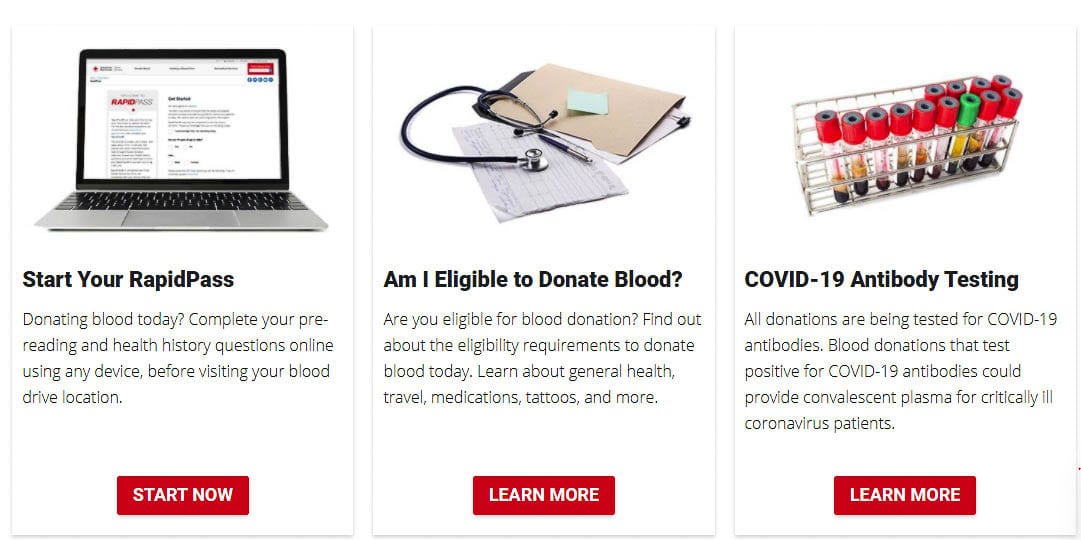Want a feel-good way to help your fellow citizens and get a free COVID-19 test? There is a shortage of blood for hospital systems nationally, so area residents can help by giving much needed blood to help fill the shortage. Here in Clark County, there is a Red Cross location and a Bloodworks Northwest location to donate.
The AABB (formerly the American Association of Blood Banks), America’s Blood Centers and the American Red Cross recently issued a joint statement warning that the country’s blood centers have reported “significant declines” in collections this year.
Paul Sullivan, the senior vice president at the American Red Cross reported that the organization is also seeing a “significant” shortage of convalescent plasma.

“We are sending convalescent plasma to our hospitals at a rate faster than we’re collecting it,” he said. “So we need to obviously turn that around. Demand is high and we need more people to come out to our blood drives.”
The Red Cross supplies about 40 percent of the nation’s blood. They indicate that more than 50,000 blood drives have been scrapped since March as the pandemic forced schools, businesses and community organizations to close. This has impacted over 1 million blood donation appointments. The Red Cross Blood Services must collect 13,000 donations a day to meet the needs of the hospitals and patients it serves.
Clark County Today reporter gives blood
Victoria Mikhaillenko was my phlebotomist. You can complete a questionnaire using their RAPIDPASS mobile app in advance. She checked my pulse, blood pressure, and a small finger-prick to test the iron level of my blood. After verifying my height and weight, we were off to the machine.
The entire process took me just under two hours, as we chatted while I sat in the very comfortable chairs. Some of the people donating watched movies or TV shows, with private headphones.
America’s Blood Centers warns on its website that 15 of its 59 community blood centers have just a one-day supply or less. Another 21 have two days or less. Your donation can make a difference.
There are multiple ways you can give blood to help. Most important is the COVID-19 Convalescent Plasma Program. The Red Cross, in partnership with the FDA, is playing a critical role in a new initiative to collect plasma, called convalescent plasma, from those recovered from COVID-19. Convalescent plasma has specific antibodies to COVID-19 making it a potentially lifesaving treatment for those with serious COVID-19 infections. If you have recovered from COVID-19 learn more about this program and how to help.
Whole blood is the most flexible type of donation. It can be transfused in its original form, or used to help multiple people when separated into its specific components of red cells, plasma and platelets according to the Red Cross. It takes about an hour, and you can donate every 56 days.

During a Power Red donation, you give a concentrated dose of red cells, the part of your blood used every day for those needing transfusions as part of their care. This type of donation uses an automated process that separates your red blood cells from the other blood components, and then safely and comfortably returns your plasma and platelets to you. It takes about 1.5 hours and you can give three times a year.
Platelets are tiny cells in your blood that form clots and stop bleeding. Platelets are most often used by cancer patients and others facing life-threatening illnesses and injuries.
In a platelet donation, an apheresis machine collects your platelets along with some plasma, returning your red cells and most of the plasma back to you. A single donation of platelets can yield several transfusable units, whereas it takes about five whole blood donations to make up a single transfusable unit of platelets.
Platelets are collected at Red Cross donation centers only, and are not collected at blood drives. It takes 2.5-3 hours, and you can give every seven days, up to 24 times a year.
During an AB Elite donation, you give plasma, a part of your blood used to treat patients in emergency situations. AB plasma can be given to anyone regardless of their blood type. Plasma is collected through an automated process that separates plasma from other blood components, then safely and comfortably returns your red blood cells and platelets to you. AB Elite maximizes your donation and takes just a few minutes longer than donating blood. It takes about 1.5 hours and you can give every 28 days.
Someone in this country needs a blood transfusion every two seconds, according to the Food and Drug Administration (FDA). While the spiking number of COVID cases and hospitalizations across the country has dominated headlines this year, that doesn’t mean that all other medical emergencies have stopped. People are still undergoing surgeries and organ transplants, for example, which require blood supplies. Donated blood is a lifeline for people including the victims of car crashes and other emergencies, as well as cancer patients who may need blood products to boost their immune systems.
The Red Cross has also teamed up with country music star Martina McBride and Suburban Propane to encourage Americans to give blood. Those who donate blood, platelets and plasma through Dec. 15 have a chance to win an Outdoor Living Experience: a socially-distanced celebration with friends and family that includes a propane-powered pizza oven, a fire pit, an outdoor heater and stipend towards propane.
While canceled blood drives have represented the biggest hit to many blood banks’ supply, the fear of contracting the coronavirus has also kept some from giving blood.
High schools and colleges are typically a reliable source for securing blood donations. According to ABC News, in New York alone, they account for 75,000 donations each school year. However, the number of school districts and colleges closed due to the surging coronavirus pandemic has intensified the problem.
“Giving blood was as easy as skipping chemistry,” said Andrea Cefarelli, senior executive director at the New York Blood Center. “But with school and college campuses closed as well as other locations like places of worship, there is a chronic deficit between what we need and how many people are giving blood.”
Further worrying health officials is the fact that winter is typically a slow season for much-needed blood donations.

Testing of all blood donations
What’s more, the American Red Cross is testing all blood, platelet and plasma donations for COVID-19 antibodies, as the convalescent plasma from whole blood donations that test positive for the coronavirus could be used to treat current COVID-19 patients who are seriously ill.
Blood donations are also essential for collecting convalescent plasma, an antibody-rich serum made from coronavirus survivors’ blood, which is used to treat perilously ill Covid-19 patients. The demand for plasma over the last month has “shot up exponentially,” according to Dr. Dan Waxman, the vice president of transfusion medicine at blood research organization Versiti.
“We are sending convalescent plasma to our hospitals at a rate faster than we’re collecting it,” said Sullivan
If you are interested in donating blood, the following organizations can connect you to a local blood-collection site to schedule an appointment. What’s more, some centers can arrange to call your mobile phone when they’re ready for you to come in, to minimize your time in the waiting area.
Vancouver Red Cross Blood, Platelet and Plasma Donation Center at 5109 NE 82nd Ave, Vancouver, WA 98662 just north of the Vancouver Mall. (800) 733-2767.
You can also donate at Bloodworks Northwest, Vancouver Center; 9320 NE Vancouver Mall Drive Suite 100, Vancouver, WA 98662. (360) 567-4800.




